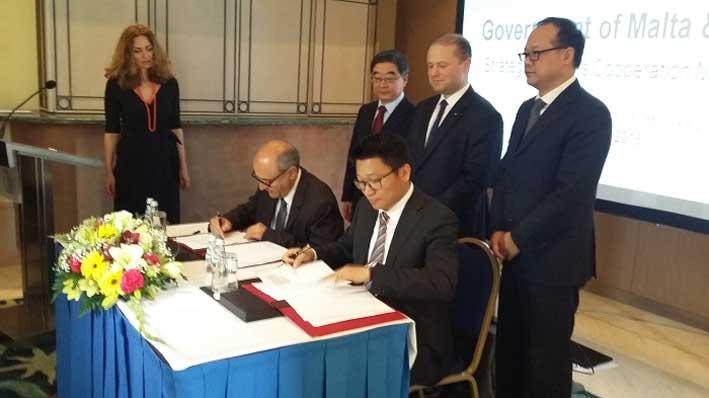New Zealand's international spy agency on Wednesday halted mobile company Spark from using Huawei equipment in its planned 5G upgrade, saying it posed a "significant network security risk."
The action follows a ban in Australia, where the Chinese telecommunications giant was blocked in August from rolling out Australia's 5G network due to security concerns.
In New Zealand, Huawei has previously helped build mobile networks. In March, Spark and Huawei showcased a 5G test site across the street from the Parliament, in a publicity move that was attended by then Broadcasting Minister Clare Curran.
The latest development could have diplomatic and economic implications for New Zealand, which relies on China as its largest trading partner but which is also part of the "Five Eyes" security alliance that includes the U.S., Britain, Canada and Australia.
At a daily briefing in Beijing, Foreign Ministry spokesman Geng Shuang said China was "severely concerned" over the decision.
"The economic and trade cooperation between China and New Zealand is mutually beneficial in nature," Geng said. "We hope New Zealand will provide a level-playing field for Chinese enterprises' operation there and do something conducive for mutual trust and cooperation."
New Zealand was the first developed nation to sign a free-trade deal with China in 2008, and China buys billions of dollars of New Zealand's dairy exports each year, which are often used in making infant formula.
New Zealand's previous conservative government had a close relationship with China. But over the past year under liberal Prime Minister Jacinda Ardern, New Zealand has pulled back somewhat, embracing a warmer relationship with Japan and putting resources into the Pacific, in part to counter China's growing influence there.
Huawei suffered a setback in the U.S. market in 2012 when a congressional report said it was a security risk and warned phone companies not to buy its equipment.
The private Chinese company was started by a former People's Liberation Army major in 1987.
Spark is one of three main mobile network operators in New Zealand. The companies compete for customers over their own network of cell towers, using radio spectrum that is licensed from the government.
Spark said it is disappointed with the decision by New Zealand's Government Communications Security Bureau. But the company said in a statement it's confident it can still launch its 5G network by July 2020.
Spark said it had wanted to use Huawei 5G equipment in its planned Radio Access Network, which involves technology associated with cell tower infrastructure. The company said it has not yet had time to review the detailed reasoning behind the spy agency's decision, or whether it will take further steps.

And Malta embraces Huawei 5G
Reports that Australia was to ban Huawei 5G had emerged just two days before the Maltese government signed a Memorandum of Understanding with the telecommunications giant to cooperate on 5G with the possibility of a trial of the technology being introduced to Maltese businesses and citizens in October.
Speaking to The Malta Independent at the time, a spokesperson for Parliamentary Secretary Silvio Schembri, who oversaw the signing of the MoU, said that “[they] cannot comment on other countries’ approach to Huawei.”
“The Company (Huawei) is a global leader in its field and operates in more than 170 countries worldwide including major European countries like the UK, Italy and Germany. We have no reason why Malta shouldn’t do the same and benefit from the innovations they bring in ICT technology development,” the spokesperson said.
Australia had flagged issues with Chinese law that requires organizations and citizens to support, assist and cooperate with intelligence work.
“It is a Chinese company, and under Communist law they have to work for their intelligence agencies if requested,” said one of the Australian government sources. “There aren’t many other companies around the world that have their own political committees.”
A Maltese government spokesperson did not answer to specific questions asking whether or not the government will have any oversight over the 5G network equipment, and what sort of system they will implement.
Huawei has already been practically blocked out of the US market after six top U.S. intelligence chiefs, including the CIA, FBI, NSA and the director of national intelligence, told the Senate Intelligence Committee last February that they would not advise Americans to use products or services from Huawei.
"We're deeply concerned about the risks of allowing any company or entity that is beholden to foreign governments that don't share our values to gain positions of power inside our telecommunications networks," FBI Director Chris Wray testified.
"That provides the capacity to exert pressure or control over our telecommunications infrastructure," Wray said. "It provides the capacity to maliciously modify or steal information. And it provides the capacity to conduct undetected espionage."
In a response, Huawei said that it "poses no greater cyber security risk than any ICT vendor."
A spokesman said in a statement: "Huawei is aware of a range of US government activities seemingly aimed at inhibiting Huawei's business in the US market. Huawei is trusted by governments and customers in 170 countries worldwide and poses no greater cyber security risk than any ICT vendor, sharing as we do common global supply chains and production capabilities."